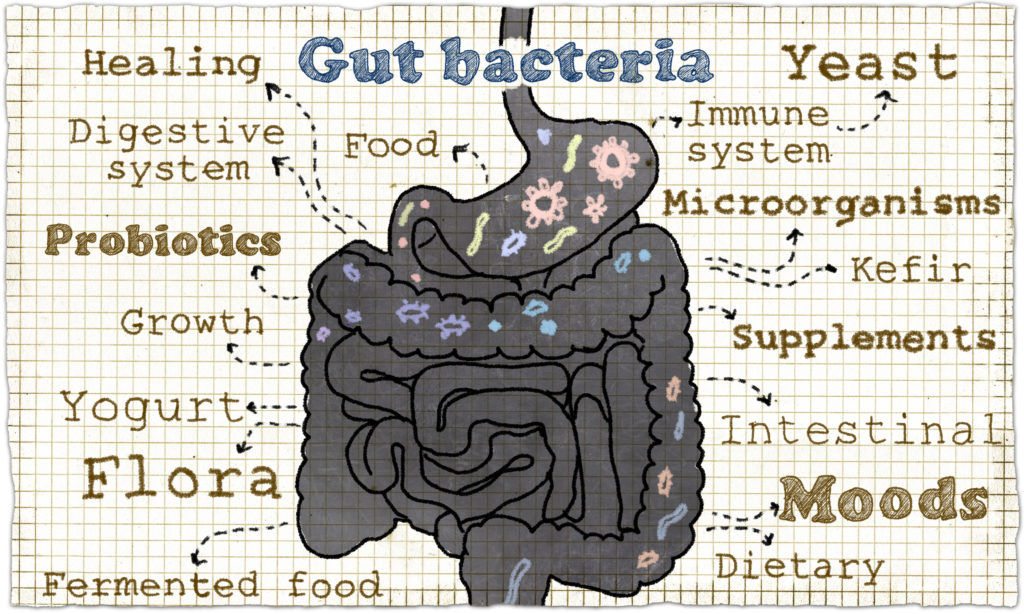How Food Quality Affects Your Gut
You have heard it before – you are what you eat! If that is true it makes sense to pay attention to the quality of food that you put into your body.

Food Quality
When you think of food quality you may think of the characteristics of food such as the appearance, texture, and flavor, but there is much more to consider when it comes to the potential impact on our overall health. When judging high-quality food you must take into account where the food comes from (local/nonlocal), the soil it is grown in (organic, pesticides), and if the person who is growing your food is thoughtful about the process and the individual who will consume it. If you consume animal products it is important to know what the animals are fed, (GMO corn or soy vs grass-fed), the conditions they live in (free roam, pasture-raised), and if they are given antibiotics and/or growth hormones.

Quality vs Quantity
As the industrial revolution changed our world, it also changed the way we eat. With the availability of processed foods, fast food, additives, extended shelf life products, and “supersize” advertising, the focus has shifted to quantity of food over quality of food and our gut health has suffered, affecting our overall health and quality of life. Now more than ever it is time to focus on the quality of the foods we eat. Everything we eat, and have eaten, makes up who we are at a cellular level, especially in our gut.

What is the gut? The Microbiome?
In your gut, there are bacteria, viruses, fungi, and other microorganisms, or microbes for short. Of these microbes, there are both “good and bad guys”—the good bacteria help improve digestion, reduce inflammation, can boost your metabolism, and help support overall health. Microbiota have even been found to be crucial for our immunologic, hormonal and metabolic balance along with our energy levels, ability to digest and absorb food, and brain function. However, an imbalance in your gut microbiome can cause issues beyond just indigestion and upset stomach. Because the gut is the home of your immune system, a poor microbiome can put you at a higher risk for autoimmune diseases, diabetes, obesity, and allergies. Diseases caused by inflammation are all affected by gut health. Your gut is both physically and chemically connected to your brain via the gut-brain axis so your gut biome can also affect your activity levels, quality of sleep, and stress tolerance. It can shape brain development and neurological function and contribute to mental illness. (4)
Foods to avoid for optimal gut health:
- Processed and fried foods
- Sugar and high-fructose corn syrup
- Artificial sweeteners
- Trans and hydrogenated fats
- Deli meats high in salt and preservatives
- Alcohol
- Corn or Soy fed animal products or those treated with hormones

It is important to read the ingredient list when purchasing food that comes in a box, can, or package. What seems to be healthy because the box says “all-natural” or “multi-grain” is extremely deceiving. If you can’t read many of the ingredients or the ingredient list has 20 items on it, chances are it is not high quality and your body will not be able to digest and absorb any nutrients. The term “empty calories” is what we are talking about here; calories that contain no nutritional value.

High-Quality Food
When you are looking for high-quality foods, look first to your local farmer’s market. You want fresh, clean, organic, pesticide-free whole foods, grass-fed and free-range animal products, and whole fruits and vegetables with fiber. If you are shopping at a traditional grocery store, look for products that have only a few, simple, natural ingredients. Educate yourself on what nutrition labels show and know what you are eating. Eat a diverse range of foods of different colors, rich in polyphenols, plant compounds found in things like green tea, olive oil, and dark chocolate. Consider adding fermented food to your food choices as they will help improve digestion and add to the good bacteria in your gut.
Remember that the way you prepare your food matters as well, so use high-quality seasonings, poach, steam, roast or sauté foods at low temperatures with healthy oils; or eat them raw.
An extra tip: giving your gut a resting period. Try to allow at least 12 hours between your last meal and the first meal of the next day. This break allows the body to focus on work that is done during the sleep process rather than working on digestion, which takes up a lot of your body’s processing power.
If you can improve your food quality, you’ll improve your microbiome, which will ultimately improve your overall health in so many ways. Remember: you are what you eat!



